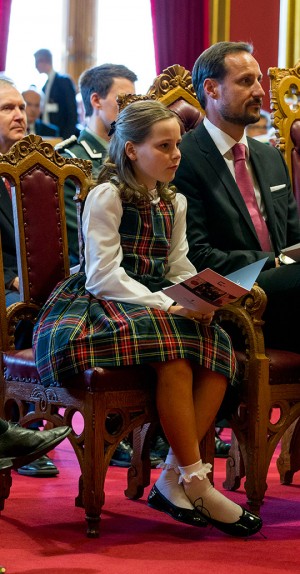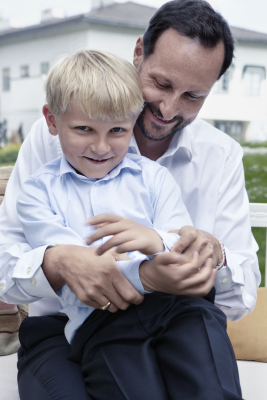NEWS ANALYSIS: As angry and demoralized Norwegian teachers voted to go on strike this week, debate continues to fly over the crown couple’s decision last week to pull their own two royal children out of their local public school. Some claim the royal family has contributed to a “devaluation” of Norwegian public schools, while teachers feel they’re being “bullied” on many fronts.

In the week since Crown Prince Haakon and Crown Princess Mette-Marit let it be known that they were enrolling their two youngest children in private schools, the chorus of critics has not died down. Even some of Norway’s strongest defenders of the monarchy, at both ends of the political spectrum, have resorted to criticizing the crown couple’s decision, contending that it sends a “bad signal” about the quality of Norwegian schools and will distance the next intended heir to the throne, 10-year-old Princess Ingrid Alexandra, from “her people.” Some claim it has weakened the royals’ credibility as leaders and supporters of the Norwegian public sector, and all the criticism has even revived debate over the future of the monarchy in general – long a paradox itself in what’s otherwise a democratic and egalitarian-minded country.
“I think it’s a problem that the royal family chose such an expensive private school that the vast majority of people would never be able to afford,” Knut Arild Hareide, leader of the Christian Democrats party (Kristelig Folkeparti, KrF), told Norwegian Broadcasting (NRK) last week. The young princess, destined to be Norway’s queen one day, will be enrolled at the Oslo International School in suburban Bærum this fall, where most classes are conducted in English and annual school fees can amount to more than NOK 100,000 per year. Many of the students at the school are children of diplomats or expatriate families with high incomes, with less than half of the studentbody actually Norwegian.
Martin Kolberg, spokesman for the party on royal issues, went so far as to say that the decision to put the royal children in private schools (eight-year-old Prince Sverre Magnus will attend a Montessori School in Oslo) may lead to the dissolution of the monarchy, and a veteran Member of Parliament from the Center Party, Per Olaf Lundteigen, agreed. While members of Norway’s new conservative government coalition mostly kept their opinions to themselves, several were quick to defend Norway’s public schools. Officials of the Socialist Left party (SV) were as upset as Kolberg. SV has been critical of the monarchy for years, and suddenly had lots of support.
While Crown Prince Haakon defended the private school plans and Crown Princess Mette-Marit refused to discuss them, this week’s commentators have mostly tried to analyze why the reaction to the royals’ preference for private schools has caused such a fuss. Thorgeir Kolshus, assistant professor in social anthropology at the University of Oslo, likened the storm of criticism to a “reaction based on grief” over the realization that Norway “is no longer a land of equal opportunity.” Kolshus wrote in newspaper Aftenposten on Thursday that Haakon and Mette-Marit have merely confirmed that they can afford expensive private school tuition and are part of a “completely ordinary” upper class.

“When the crown couple took their children on an extended trip outside regular holiday periods (a move that also stirred controversy), they showed that there are differences between people,” Kolshus wrote. The decision to now take their children out of public school altogether reinforces that, he suggests: Norway “has always been a class-based society … but we have also had an idea that there are various arenas where everyone meets,” like at school, for instance. Now, Kolshus contends, it’s “sorrow over lost opportunities to provide the most equal opportunity” that’s behind all the disappointment and criticism over the royals’ choice of schools.
Other have argued that the private school preference spurred outrage because it shatters a carefully built illusion of the Norwegian royals as “folksey” and down-to-earth. That’s long been a myth, counter others: The Norwegian royals, rooted in British and Danish aristocracy, have always been privileged and kept at a distance from the masses, and the crown couple has, again, merely confirmed that.
Royal evaluation that schools ‘aren’t good enough’
Most hurt, meanwhile, have been the teachers and other academics, who contend that Crown Prince Haakon can only have evaluated their local Norwegian public school in Asker as “not good enough.” As the debate rolled on this week, Professor Arild Tjeldvoll at the University of Oslo wrote in newspaper Dagens Næringsliv (DN) on Thursday that “the county’s next king (Crown Prince Haakon) won’t risk having his own children” in the local Norwegian school. Teachers are miffed: “I have tried to think that it must be alright for the crown couple, as parents, to choose where their children should go to school,” wrote teacher Ane Krogsæter Aarre, a member of the school blog collective Lærerråd (Teachers’ Council). “But I can’t manage, I really can’t manage. Because as a teacher, I can’t help but feel that this sticks even deeper for us than politicians can understand.” Teachers and schools have been under pressure for years, after concerns about low scores on international tests, a lack of classroom discipline and a lack of students wanting to become teachers. Politicians tried to reverse the trend, and Tjeldvoll contends there’s been improvement.
Now the teachers themselves have voted to go on strike, angry over attempts to regiment their workday and worried they’ll have even less time to spend per pupil. “We’ve let ourselves be bullied long enough,” elementary school teacher Anne Lillejordet told newspaper Aftenposten on Thursday. She and colleague Henriette Stabæk said they’re more than ready to staff the picket lines and disrupt the start of school in August, to state their case. An estimated 92,000 other teachers like them have also been angry not only at their municipal employers but also at their own union, and feel like they just don’t get any respect.
Princess Ingrid Alexandra and Prince Sverre Magnus now won’t face a closed school and striking teachers when the new term begins. They will face different educational experiences from the vast majority of other Norwegians, though, in their new private schools that are not representative for the country’s school system, for better or worse. As one commentator put it, that’s been their parents’ royal choice.
newsinenglish.no/Nina Berglund

